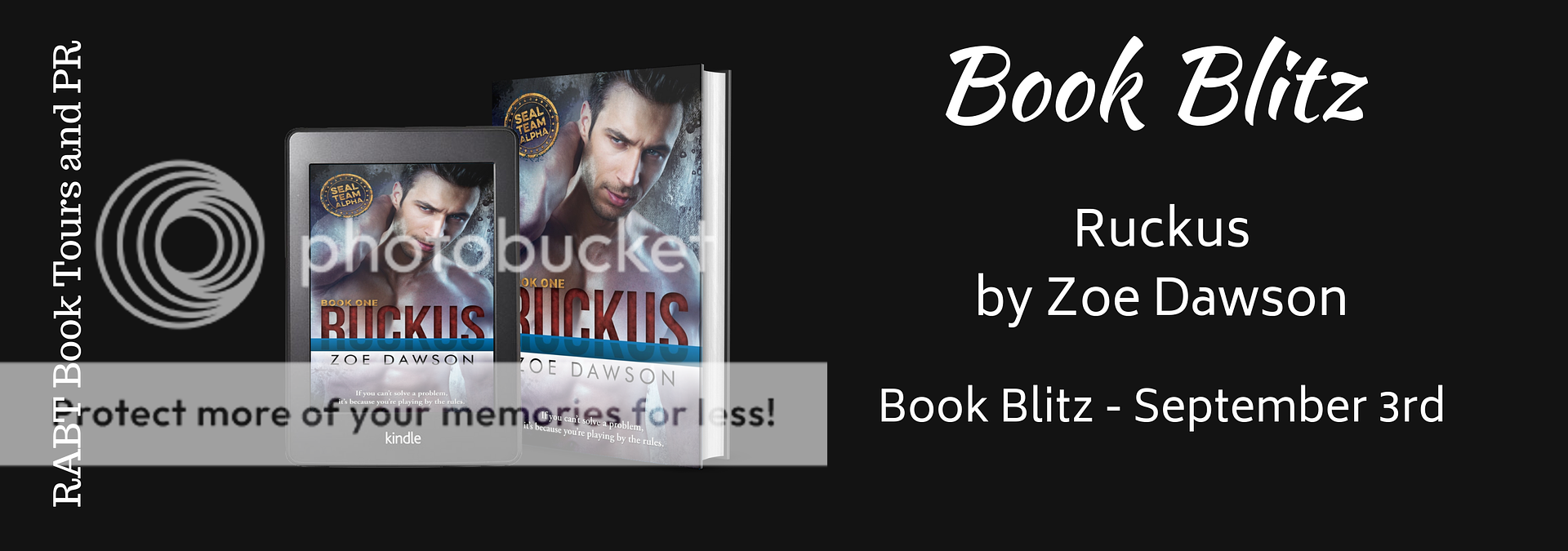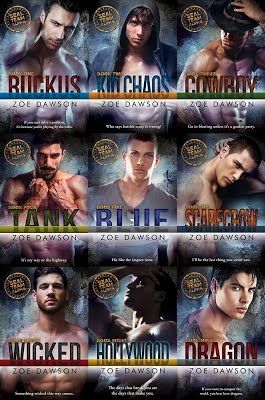
SEAL Team Alpha, Book 1
Romantic Suspense
Promo Special – Currently Free in ebook format at all online retailers.
For U.S. Navy SEAL, Bowie “Ruckus” Cooper, going on a mission into the most dangerous place on earth wasn’t new, neither were the orders to tag and bag an international criminal, but when Bowie finds a captive American reporter, that wasn’t exactly run of the mill. Neither was getting separated from his team, teaming up with her or protecting her against all odds, while working to keep his hands from around her neck and off her delectable body.
Other Books in the SEAL Team Alpha Series:
Kid Chaos
SEAL Team Alpha Book 2
Cowboy
SEAL Team Alpha Book 3
Tank
SEAL Team Alpha Book 4
Blue
SEAL Team Alpha Book 5
Scarecrow
SEAL Team Alpha Book 6
Wicked
SEAL Team Alpha Book 7
Hollywood
SEAL Team Alpha Book 8
Dragon
SEAL Team Alpha Book 9
Excerpt
Turbo, Columbia, South America
Heading into the world’s most dangerous jungle hadn’t been on Dana Sorensen’s radar until months ago when she’d gotten an email from her dying mother asking Dana to do something for her. Tell these peoples’ stories. Let the public know what was happening. It had been the last correspondence Dana had received before her mom, her brave, beautiful, accomplished mom had lost her fight with cancer.
As a surgeon involved with Doctors Without Borders, her mom had met and married Dana’s dad, who was a nurse also serving with them. She often wondered if she could even live up to her mom’s ability to be so selfless. Even as the tears moistened her eyes, Dana tried to tell herself that she had no way of knowing her mom was going to go so fast, before Dana could get home. And, with guilt pressing in from all sides, eating at her, the grief still fresh, Dana was going to fulfill her mom’s dying wish. Come hell or high water.
She’d pitched her mom’s story to the editor for Trek Magazine about migrants traveling through the Darién Gap to make it from Colombia to Panama, then up through the Central American peninsula with the final destination the US. It had all stemmed out of her mom’s last trip to Asia where she’d found out that a lot of migrants were heading through South America to bypass the routes that had dried up due to stronger restrictions. And it wasn’t just Asia, but a slew of foreigners looking for a better life free from war and persecution.
But here she was standing on a dock in Turbo, Colombia, a disreputable port town rife with violence on the coast of Colombia and in the horseshoe of the Gulf of Urabá to fulfill her mom’s wish. It was just before dawn, the sun nothing but a glimmer on the horizon. She waited for a boat that would take her and her crew into the Darién Gap, a place that was teeming with dense jungle, dangerous wildlife, impenetrable swamps, wary guerrillas, intense paramilitary, deadly drug traffickers, disreputable guides and no marked trails.
The Darién might be a ten-thousand-mile swath of inhospitable land, but Dana was a correspondent who, due to her mom and dad’s noble example, had given up reporting about the war in exchange for pieces on the human condition. She was now a writer, photographer, filmmaker and contributing editor to International Humanitarian Journal. From her war correspondent experience, she could handle stressful encounters and dangerous people as situations that were all in a day’s work. She’d had some harrowing experiences in her life, but had gotten the story every time. This piece was timely, a hot button and would allow her to showcase what people would do for freedom and a better life along with keeping her promise to her mom. But going into the Gap was risky. She was well aware of the dangers, but had never let that stop her before. These stories needed to be told.
She needed to tell them.
There were several people with her from her film company, along with porters heading to Domingodo to meet up with a representative from the Revolutionary Armed Forces of Colombia or FARC, Cuba-backed guerrillas who had been at war with Colombia since 1964. They controlled the most direct route through the Gap, and it would be her best chance of meeting and talking to migrants attempting the crossing. Permission had been obtained from an official in Havana to pave the way for her and her crew to do this timely story.
The soft drone of an outboard motor broke the predawn quiet. James Quinn, a freelance videographer she’d hired to document the trip leaned over and said, “Are you ready for this?”
She smiled. “I was born ready.” He and her South African producer and naturalized American, Liam Nelson were the two crew members accompanying her on the trip. Her cell chimed and she pulled it out of her cargo pants and read the screen. Jeffrey. He had been calling ever since she’d left San Diego and her office to make this trip.
She hit the accept button and said, “Hi, there.”
“Dana, geez woman, you’ve been a hard one to get a hold of. I really needed to talk to you before you left. It was important.”
“I know, but the okays came through for this trip and I had to go. You understand.”
He sighed heavily. “I do. I know how much your mom meant to you.” At his words, her eyes filled, and she worked at not losing it. “Look I’d be the first one to say what you do is great. You have more courage than some men I know. I would never stand in the way of that, but—”
“I know, and I promise to make time when I get home.”
She wiped her slick palm on her pants. Why was this simple conversation with Jeff making her palms sweat? She swallowed and kept her voice nonchalant. Because she had been sure that he was going to pop the question. That’s what he wanted to talk to her about—getting married. She wasn’t sure she was ready for that. If she would ever be ready for that.
She squeezed her eyes closed on that thought, the unnamed emotion clogging her chest. Every time she thought about marriage it would crop up like some kind of plague. She’d been in some pretty scary situations, so why did marriage make her want to run for the hills like a scared little girl?
“Promise?” he said.
“Promise,” she replied. The motor boat pulled up beside the dock along with another boat whose engine had been drowned out by their transportation. It was a ferry to Sapzurro and Capurganá where migrants could then traverse overland to La Miel, Panama. These migrants weren’t forced to go through the Gap as they had documentation that would allow them to pass without a problem. That wasn’t the route of her story.
People without documentation were forced to hire coyotes, part of the Clan Los Piratas who would charge between five hundred to seven hundred dollars, and transport them in poorly maintained boats, often leaking. But were also notorious for conscripting migrants as mules, then disposing of them.
That was her story.
The most dangerous clan in the area, Clan Los Piratas was a neo-paramilitary group with upwards of twenty thousand members. Dana had read that they had murdered several Americans, many DEA agents in the area and were on the US government’s list. They had a stronghold in the Darién Gap, but she was confident they wouldn’t bother them with their FARC approval and their sanctioned story about the migrants.
Even as the sun rose and the misty jungle lay like a dense, dark giant across the river, she shivered in the steamy air.
As her crew loaded up their gear into the motor boat, Dana disconnected the call. She’d worry about Jeff when she got home. She didn’t need distractions on this trip. After meeting their contact, Captain Enrique Escobar, a middle-aged, dark-haired man with gray at the temples and in his close-cropped beard, his sharp eyes and features telling Dana he had seen plenty in the Gap. During the dire week, with the constant threat of robbery, kidnapping, and death, he and his men hiked the route, while she and her crew recorded one of the world’s most dangerous journeys. She and her crew had hacked through spiderinfested mangrove swamps, walking for days in muggy, ninety degree temperatures, the migrants surviving on crackers and gulping river water. Each of these people—a man from Jafar, Bangladesh trying to escape its cutthroat political gangs and miserable working conditions; another Bangladesh woman, not much more than a girl—a rural laborer who’d gone to the jam-packed cities for work and found herself locked in the bowels of unlicensed garment factories working for twenty cents an hour; and countless others, Syrians, West Africans, and Cubans. She’d interviewed many of them who told their heartbreaking stories. She and her crew documented everything on memory cards and they were carefully kept in a waterproof bag in her pack. By accident, she found some old footage of her and her mom when she’d met up with her overseas and interviewed her for a piece that had never been aired. Stupidly, she’d forgotten about it and realized this was her only copy. She’d edit this and get it aired when she got home. She’d contact someone she knew at 60 Minutes or National Geographic who would jump at the chance. Once they reached their destination, they were stopped by Senafront, Panamanian soldiers who guarded the border, the travelers’ hopes of freedom and respite were dashed. The migrants were denied entry into Panama, everything they had suffered and endured had been in vain. Fighting her sense of justice, she tried to tell the Panamanian patrol what kind of journey they had made, how courageous they had been. The officer was sympathetic, but he had no choice, he had to follow orders. There was nothing she could do. All that was left for her was to tell their story, document their journey so that their efforts meant something. A painful discomfort under her sternum along with a healthy dose of guilt suffused her as she boarded a piragua to take them to Panama City and the airport for their trip out of the Gap. Home to San Diego to civilization, concrete and glass, teeming with urbanites. But her uneasiness wouldn’t go away. She tried to think about processing this film and documenting the trip. Her heart was heavy, real sorrow for the plight of the people she’d gotten to know so well in the week of traveling with them through the dangerous and deadly Gap, an emptiness deep inside she couldn’t name for fear of… what?
As a storm came up quickly and violently out of the south, they were forced to pull to the bank to wait it out. Dana pitched her waterproof tent and settled inside, lying down on her side. As the leaded sky darkened, she fell into a fitful sleep.
She woke to the crack of gunfire, screaming and running feet. Before she could move, a gun was shoved into her back. She looked over her shoulder at the merciless dark eyes of the man holding the weapon.
“Hello, Dana Sorenson. I’ve got a job for you.”
Before she could gasp a response, he had her out of the tent.
“Who are you?” she demanded. “What do you want?”
“Oh, before too long you will know who I am and what I want.”
A black hood descended cutting off light and hope.
When she fought, someone clipped her on the back of the head and she fell to the ground.
She’d been taken.
Kidnapped.
About the Author
Zoe Dawson, the author of 40+ books had always dreamed of becoming a full-time romance writer. Her other passions include traveling the world, owning a beach house (she believes she was a mermaid in another life), and seeing her books in movies. When she’s not writing, she’s painting or killing virtual MMORPG monsters in World of Warcraft. She lives in North Carolina with her two grown children and one small, furry gray cat.
Contact Links
Purchase Links
















